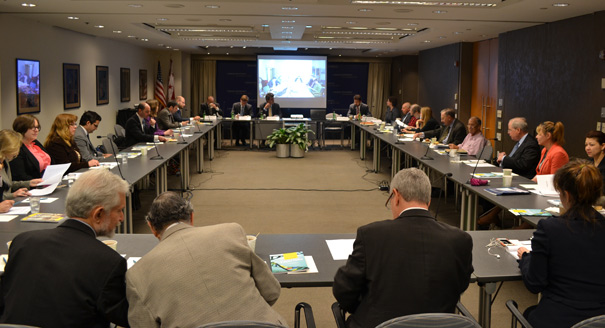Registration
You will receive an email confirming your registration.
The United States and Russia have a long history of medical collaboration and health cooperation. In the past, open dialogue between the two nations’ scientists has led to such substantial advancements as the production and application of the polio vaccine and the eradication of small pox. The Carnegie Endowment put together a public-private task force to further this relationship and deepen the dialogue in this sphere. The task force was created to support the Health Working Group of the U.S.-Russia Bilateral Presidential Commission. The task force focused on four possible dimensions of cooperation: strategic resource allocation, healthy lifestyles (with a focus on noncommunicable diseases, or NCDs), science cooperation and technology transfer, and regulatory convergence and harmonization.
Carnegie hosted an event to launch the task force’s final report. Keynote speakers included Daniel A. Russell, Deputy Assistant Secretary of State; Oleg Burmistrov, Deputy Chief of Mission and Minister-Counselor of the Embassy of the Russian Federation; Nils Daulaire, Assistant Secretary of Health and Human Services; and Mark Rybakov, Counselor with the Ministry of Foreign Affairs of the Russian Federation. Other speakers included Judyth Twigg of Virginia Commonwealth University, Joshua Abrams of the Campaign for Tobacco-Free Kids, Marya Levintova from the National Institutes of Health, and Jonathan Kimball, PhRMA. Carnegie’s Matthew Rojansky and John Steele of Eli Lilly moderated.
Strategic Resource Allocation
Twigg discussed how resources must be strategically allocated to deliver the highest quality care to the most people, all while controlling costs. She listed some of the task force’s recommendations for maximizing effectiveness of both systems:
- Create a system of standardized, institutionalized, and digital medical records.
- Increase access to quality care.
- Collaborate to create new models for prescription drug payment plans.
- Stress prevention of chronic illnesses, rather than allocating majority of resources to treatment.
- Create incentives to encourage medical students to become primary care physicians.
- Emphasize the importance of immediate, rather than delayed, medical treatment.
She added that the task force suggests that the two countries should collaborate to:
- Share knowledge of medical technology.
- Increase evidence-based clinical practice.
- Collaborate on immunization campaigns.
- Improve access to care for underserved populations.
- Emphasize the importance of professional exchanges.
Healthy Lifestyles
Abrams emphasized the importance of both governments improving their information sharing and knowledge transfer processes. He explained that the healthy lifestyles taskforce subcommittee recommended the following:
- Emphasizing prevention and early detection
- Incentivizing healthy choices.
- Cooperation on targeted action programs to cut back cardiovascular disease.
- Continued cooperation on tobacco and alcohol control.
- Developing joint programs to promote exercise and healthy living.
Science Cooperation and Technology Transfer
Levintova discussed her organization’s role in facilitating U.S.-Russian medical cooperation:
- Facilitating Cooperation: The National Institutes of Health have played an important role in facilitating U.S.-Russian medical cooperation, Levintova said. For example, the office of AIDS Research has a budget created specifically for U.S.-Russian collaboration on the issue.
- Private Sector: Levintova stressed the importance of private companies in developing and furthering exchanges between the two nations.
- Legislature: Both the Russian and American legislative processes need to be streamlined for maximum effectiveness, Levintova added.
Regulatory Convergence and Harmonization
Kimball discussed possible improvements to the pharmaceutical regulation practices of both countries. He suggested:
- Implementing a system of mutual recognition of clinical trials.
- Creating a forum between both countries for regulatory convergence and harmonization.
- Stressing good manufacturing practice (GMP).
